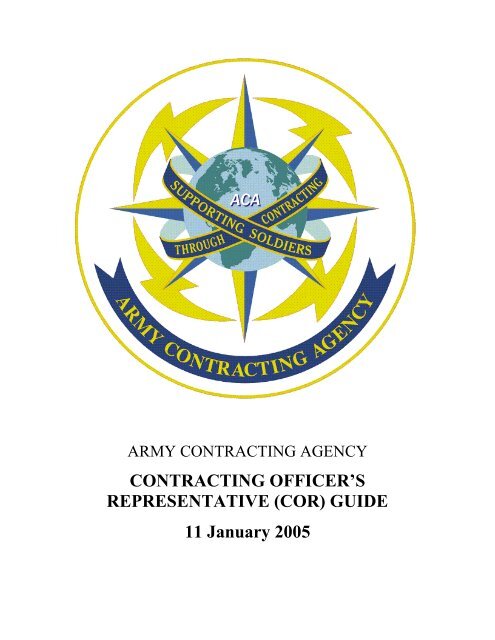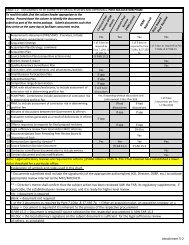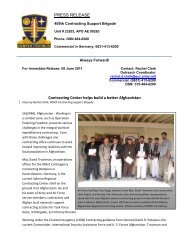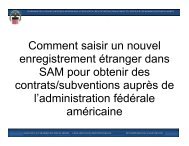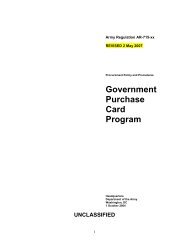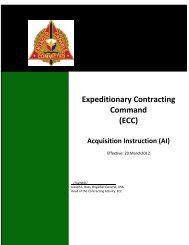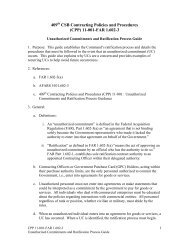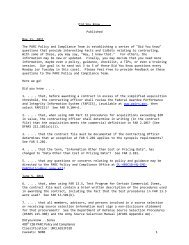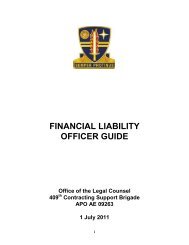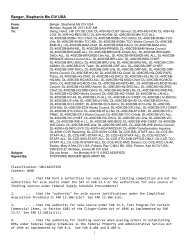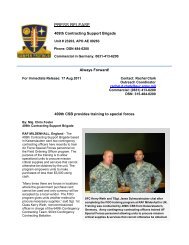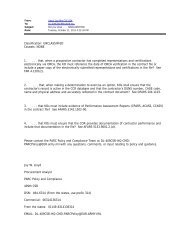CONTRACTING OFFICER'S REPRESENTATIVE (COR) GUIDE 11 ...
CONTRACTING OFFICER'S REPRESENTATIVE (COR) GUIDE 11 ...
CONTRACTING OFFICER'S REPRESENTATIVE (COR) GUIDE 11 ...
- No tags were found...
Create successful ePaper yourself
Turn your PDF publications into a flip-book with our unique Google optimized e-Paper software.
ARMY <strong>CONTRACTING</strong> AGENCY<strong>CONTRACTING</strong> OFFICER’S<strong>REPRESENTATIVE</strong> (<strong>COR</strong>) <strong>GUIDE</strong><strong>11</strong> January 2005
TABLE OF CONTENTSSectionPagePurpose 2The Role and Responsibilities of the <strong>COR</strong> 3Nomination and Appointment 4General 4Nomination 4Appointment 5Training Requirements 6Unauthorized Commitments and Ratifications 7Standards of Conduct (Ethics) 9Actions the <strong>COR</strong> Must Do 9Actions the <strong>COR</strong> Must Not Do 9Duties Performed by the <strong>COR</strong> <strong>11</strong>Pre-Award Tasks <strong>11</strong>Best Value Trade-off Continuum (FAR 15.101) <strong>11</strong>Acquisition Planning <strong>11</strong>Determination of Need <strong>11</strong>Market Research/Market Surveillance <strong>11</strong>Purchase Requests 12Source Selection 12Socioeconomic Programs 12Post-Award Tasks 13Contract Administration Planning 13Post Award Conferences 14Contract Oversight and Surveillance 15Terminations of <strong>COR</strong> Duties 17Documentation Requirements 18<strong>COR</strong> Working File 18<strong>COR</strong> File Contents 19Importance of Teamwork 221
PURPOSEThis guide provides a ready reference for requiring activity personnel to use in performing theirduties as a Contracting Officer’s Representative (<strong>COR</strong>). It describes the role and authority of the<strong>COR</strong> and identifies the <strong>COR</strong>’s most important responsibilities and duties. This guide also shouldbe used by the Contracting Officer and other members of the acquisition team as they work withthe <strong>COR</strong> throughout the acquisition process.For an overview of the government acquisition process and a description of the various contractingmethods and contract types, refer to the ACA Customer Guide athttp://aca.saalt.army.mil/Library/ACA%20guides/ACA%20Customer%20Guide%2005-17-04.doc. The Customer Guide also explains the key duties of personnel in the contracting office andthe requiring activity. Other relevant ACA guides include the following: Best Value; Contactswith Industry; Contractors in the Workplace; Market Research; and Unauthorized Commitmentsand Ratification Process. Detailed information concerning related policy areas is available fordownload in the Reference Library section of the ACA website athttp://aca.saalt.army.mil/Library/Library.htm.Strictly speaking, the term <strong>COR</strong> refers to a person designated by the Contracting Officer toperform certain administrative tasks related to a specific contract in accordance with Subsection201.602-2 of the Defense Federal Acquisition Regulation Supplement (DFARS) athttp://farsite.hill.af.mil/reghtml/regs/far2afmcfars/fardfars/dfars/Dfars201.htm#P255_14285. Inthis guide, the term includes duties that may occur throughout the acquisition process. Particularlyin Performance-Based Acquisitions, the <strong>COR</strong> must play a central role in the pre-award phase, aswell. Part I of this guide covers the duties and responsibilities of the <strong>COR</strong> under DFARS 201.602-2 and Part II covers duties leading up to contract award.As the Army increasingly relies on industry to perform services that are vital to its mission, the<strong>COR</strong> has become one of the most important players on the acquisition team. Part 37 of the FederalAcquisition Regulation (FAR) covers the Government’s policy for service contracts. FAR Part 37is available on-line at http://farsite.hill.af.mil/reghtml/regs/far2afmcfars/fardfars/far/37.htm#P0_0.The Federal Acquisition Institute (FAI) issued the “Contracting Officer’s TechnicalRepresentative (COTR) Training Blueprint” to provide a foundation for all COTR, or <strong>COR</strong>,training and development activities within the Federal Government. The COTR Blueprint definescore capabilities and key competencies that are essential for performing the most essential dutiesof the COTR. The document is available for download athttp://www.fai.gov/prodev/corbluebook.pdf.Another valuable source of information is the “Guidebook for Performance-Based ServicesAcquisition (PBSA) in the Department of Defense,” which explains the key elements ofperformance-based acquisitions. It provides sample documents and links to other websites and isavailable for download at http://www.acq.osd.mil/dpap/Docs/pbsaguide010201.pdf.An interagency task group developed The Seven Steps to Performance-Based Services Acquisition(PBSA) Online Guide, which is available of the Acquisition Network website athttp://www.arnet.gov/Library/OFPP/BestPractices/pbsc/index.html. The guide is an interactivemanagement and training tool, which includes regulations, policies, guidance, samples, and alibrary of other electronic resource tools.2
THE ROLE AND RESPONSIBILITIES OF THE <strong>COR</strong>The primary role of the <strong>COR</strong> is to monitor the contractor’s performance and serve as the technicalliaison between the contractor and the contracting officer, who has authority and responsibilityover all aspects of the contract.The ACA Customer Guide explains in detail the respective roles and responsibilities of thecontracting officer, customer personnel and other members of the acquisition team, as follows:The contracting officer is responsible for the contract, including terms and conditions andhas ultimate responsibility for ensuring that the contractor satisfies the requirements statedin the contract.Only a duly appointed contracting officer has the authority to:o Enter into and administer a contract on behalf of the U.S. Government;o Change or terminate an existing contract; ando Make determinations and findings relating to the contract.The <strong>COR</strong>’s authority is received by appointment from the contracting officer. Thisappointment must:o Be made by the contracting officer in writing;o Clearly describe the limits of the <strong>COR</strong>’s authority; ando Ensure that the <strong>COR</strong> has received appropriate training.The <strong>COR</strong> has the responsibility to:o Acknowledge in writing receipt of the delegation letter;o Carefully read and understand the contract;o Fulfill the government’s commitments to the contractor;o Serve as a liaison between the contracting officer and the contractor;o Monitor the contractor’s performance under the contract; ando Ensure that the contractor delivers what is called for in the contract.The <strong>COR</strong> and contracting officer, together, must ensure that the contract calls for deliveryof products and services that satisfy the bona fide needs of the Government.3
NOMINATION AND APPOINTMENTGENERALOnly contracting officers have the authority to appoint a <strong>COR</strong>. DFARS Subpart 201.6 givescontracting officers the authority to designate a representative to assist in performing specifictechnical and administrative functions in support of a government contract.<strong>COR</strong> appointments should be made at the outset of the acquisition process if possible to enable the<strong>COR</strong> to participate in developing the contract specification/work statement and other pre-awardactivities that will affect the <strong>COR</strong>’s post award responsibilities.Contracting offices should maintain a list of <strong>COR</strong>s to use in providing relevant information relatedto contracting matters, best practices, and training opportunities.NOMINATIONThe requiring activity submits the nomination to the contracting officer in accordance withDFARS 201.602-2. The nominee’s supervisor must certify the nomination before its submittal tothe contracting officer. Nomination packages should demonstrate through training or relevantexperience that the nominee possesses:Knowledge of the government contracting process;Understanding of pertinent contract clauses, such as changes, payments, governmentfurnishedproperty, inspection and acceptance, and termination;Familiarity with pertinent concepts, such as contracting authority, contract incentives,fixed-price versus cost reimbursable contracts, excusable versus non-excusable delays incontract performance, options, and Task Order contracts;The ability to analyze, interpret, evaluate, and document factors involved in contractadministration; andSufficient time and resources to accomplish these duties, given the contracts nominee iscurrently managing and other workload commitments.The nomination package should identify:The contracts for which nominee has performed <strong>COR</strong> duties;Relevant education and training, including nominee’s:o On-the-job training experience, describe each work assignment and the instructionprovided and includes dates for each assignment;o Mandatory <strong>COR</strong> training, provide completion date and mode of instruction; ando Equivalent training, provide information about the course to enable the contractingofficer to determine its acceptability as an equivalent.The nominee’s security clearance or other specified requirements, if needed.Each requiring activity should have an overall nominating official, normally the head of therequiring activity, to ensure that all nominees will have the experience, training, and abilityappropriate to the importance and complexity of the contracts they will manage.4
APPOINTMENTDFARS 201.602-2 sets forth the following conditions for appointment of a <strong>COR</strong>.The individual must:o Be a Government employee, unless otherwise authorized in agency regulations; ando Have training and experience commensurate with the <strong>COR</strong> responsibilities inaccordance with department/agency guidelines.The designation must be in writing, with a copy furnished to the contractor and thecontract administration office, stating:o The extent of the <strong>COR</strong>'s authority to act on behalf of the contracting officer;o Any limitations on the <strong>COR</strong>'s authority;o The period covered by the delegation;o That the authority cannot be redelegated; ando That the <strong>COR</strong> may be personally liable for unauthorized acts.The <strong>COR</strong> may not receive the authority to:o Perform functions that have been delegated to a contract administration office underFAR 42.202(a); oro Make any commitments or changes that would affect the price, quality, quantity,delivery, or other terms and conditions of the contract.The <strong>COR</strong> must maintain a file for each assigned contract. The file must include, as aminimum:o A copy of the contracting officer's letter of designation and any other documentationdescribing the <strong>COR</strong>'s duties and responsibilities; ando Documentation for all actions performed under the delegation of authority.Contracting officers normally only appoint one <strong>COR</strong> for each contract. In some cases, particularlyin large or complex acquisitions, the contracting officer may appoint more than one <strong>COR</strong>. Inaddition, the contracting officer may designate an alternate <strong>COR</strong> (A<strong>COR</strong>) with authority toassume the responsibilities and functions assigned to the <strong>COR</strong>, if the <strong>COR</strong> is absent due to leave,illness, or official business. The contracting officer must make this designation in writing, subjectto the same requirements as the primary <strong>COR</strong>. The A<strong>COR</strong> should maintain an active rolethroughout the life of the contract.When appointing a <strong>COR</strong>, the contracting officer must:Insert the clause at DFARS 252.201-7000, Contracting Officer’s Representative, in thesolicitation and contract; Prepare the appointment letter(s) in compliance with the requirements in DFARS 201.602-2;Determine that the nominee has the requisite job experience and accomplished the requiredtraining;Assess the nominee’s technical and administrative competence to ensure his or her abilityto perform the <strong>COR</strong> duties in an effective and responsible manner;5
Provide orientation, instructions, and training specific to the instant acquisition;Ensure that all <strong>COR</strong> appointment letters are properly signed by the appointee and returnedin a timely manner; andMaintain records in the official contract file for each <strong>COR</strong>, including:o The nomination package;o Signed letters of appointment; ando Other pertinent documents relating to the <strong>COR</strong>’s qualifications and actions.The <strong>COR</strong> may task other individuals to serve as assistants when appropriate to help monitorcontractor performance or to accomplish other activities. However, only the designated <strong>COR</strong> maydiscuss proposed tasks with the contractor or submit <strong>COR</strong> reports to the contracting officer. The<strong>COR</strong> must ensure that all assistants:Have the necessary knowledge and experience to perform their duties;Receive required ethics training; andSubmit conflict of interest statements to the contracting officer.Training RequirementsAll <strong>COR</strong>s must complete the USA Logistics Management College’s (ALMC) <strong>COR</strong> course orequivalent before the contracting officer may issue a letter appointment. Information about theALMC <strong>COR</strong> course is available at http://www.almc.army.mil/AMD/ALMC-CL/index.asp. Prior<strong>COR</strong> experience is not an acceptable substitute for the ALMC or equivalent training. Somecommands require additional <strong>COR</strong> training, as well.ACA recommends the following as a minimum acceptable level for <strong>COR</strong> training:The ALMC <strong>COR</strong> course, which is available in the following modes:o Resident at ALMC: One-week, in resident at Fort Lee, VA. Obtain course applicationand dates through your training representative.o On-Site ALMC: One-week on-site course taught by ALMC faculty, normally identicalcontent to the resident course. Obtain course locations and dates through your trainingrepresentative.o Satellite Education Network (SEN): Formal classroom instruction on-site using a livetelevised broadcast from ALMC, with a voice network to permit discussions betweenthe instructor and the students. Contact your training representative for details.o On-Site ALMC Accredited Training: Formal classroom instruction on-site using coursematerials furnished by ALMC, with the local activity providing facilities andinstructors. ALMC instructors may augment the team, when available. Contact yourtraining representative to find out about availability at your activity.o Equivalent Courses: Several contractors and other sources offer <strong>COR</strong> courses. If thecontracting officer agrees to accept a course as a valid substitute for the mandatorytraining, contact your training representative to arrange for taking the course.<strong>COR</strong>s should review training course materials frequently, but no less than annually. <strong>COR</strong>swho manage large or complex contracts should consider taking the ALMC course or itsequivalent every 5 years to maintain currency in <strong>COR</strong> practices.6
<strong>COR</strong>s should take refresher training of at least six (students choice of topics) of the 18modules offered by the on-line Federal Acquisition Institute (FAI) Mentor course availableat http://www.fai.gov/.The contracting office may, from time-to-time, require or provide other training courses.UNAUTHORIZED COMMITMENTS AND RATIFICATIONSOnly the contracting officer has the authority to enter into, modify, and administer a contract. Theauthority of the <strong>COR</strong> is limited to the responsibilities explicitly stated in the nomination letter. A<strong>COR</strong> must not in any situation direct the contractor to take any action that would change thecontract, such as the following:Total price or estimated costProduct deliverablesSOW/PWSDelivery datesTotal period of performanceThe administrative provisions of the contractWhen a <strong>COR</strong> exceeds his or her delegated authority, an unauthorized commitment (UAC) or aclaim against the Government may result. For example, suppose a <strong>COR</strong> tells the contractor thatthe product would be better if the contractor used a different material. A UAC may result if thecontractor takes the <strong>COR</strong>’s statement to be direction and substitutes the new material for the old.To avoid an unauthorized commitment, the <strong>COR</strong> should first make it clear to the contractor that heor she does not have authority to give such direction and then submit a recommendation to thecontracting officer to modify the contract.Another example of a potential UAC is when the Government continues to conduct business asusual with the contractor after a contract lapses but has not been formally renewed or extended. Inthis case, the failure of the <strong>COR</strong> to notify the contracting officer in time to renew the contract or topromptly notify the contractor of the situation could be an unauthorized commitment.In general, the <strong>COR</strong> must not take any of the following actions:Make any commitments or promises relating to award of contracts or any representationthat would be construed as such a commitment;Issue instructions to the contractor to start or stop work;Encourage the contractor by words, actions or a failure to act to undertake new work or anextension of existing work beyond the stated contract period;Interfere with the contractor's management prerogatives with its employees, such as"supervising" or otherwise directing their work efforts of an employee;Accept products or services not expressly required by the contract; andUnless directed by the contracting officer, authorize a contractor to:o Obtain property for use under a contract; oro Allow a contractor to use government property accountable under one contract in theperformance of another contract.7
In most cases, the contracting officer will counsel a <strong>COR</strong> that has exceeded his or her authority, ortake other steps to ensure that the error is not repeated. However, in cases of gross abuse, thecontracting officer may revoke the <strong>COR</strong> appointment immediately, without giving the <strong>COR</strong> asecond chance.UACs are very serious matters that may result in personal liability or other adverse consequencesfor the <strong>COR</strong>. Guidance related to unauthorized commitments and ratification procedures isavailable on the ACA web site at http://aca.saalt.army.mil/Library/ACA%20Guide%20UACs-Ratifications%2006-03-04.doc.8
STANDARDS OF CONDUCT (ETHICS)As important representatives of the government, <strong>COR</strong>s must maintain high ethical standards at alltimes. The Department of Defense Standards of Conduct Office (SOCO) athttp://www.defenselink.mil/dodgc/defense_ethics/ provides information relating to the ethics andstandards of conduct programs throughout DoD. This includes ethics training materials and linksto DoD Regulation 5500.7-R, Joint Ethics Regulation (JER), which is available for download athttp://www.defenselink.mil/dodgc/defense_ethics/.The Acquisition Ethics Program is the primary guideline for the actions and activities ofgovernment representatives. Topics include favors, gratuities, and consideration for services,conflicts of interest, and the unauthorized use of official U.S. Government positions. The DefenseAcquisition Ethics Program sets the following fundamental ethical principles:Integrity: People with integrity are principled, honorable, and upright. They are consistentin their moral behavior and do not adopt an “end-justifies the means” philosophy.Honesty: Honest people are truthful, sincere, and candid. They do not mislead, actdeviously, or misuse or disclose information learned in confidence.Fairness: Fair people show a commitment to justice, equal treatment, and tolerance. Theyare unbiased, open-minded, and where appropriate, willing to change their positions.ACTIONS THE <strong>COR</strong> MUST DOBe familiar with the requirements of the JER and FAR 3.104, Procurement Integrity, andsupplements.Treat contractors impartially.Avoid any situations involving conflicts of interest.Safeguard all procurement sensitive and proprietary information.Report any suspected violations to the contracting officer and/or the ethics counselor.File required financial and employment disclosure reports.Attend yearly ethics and procurement integrity training.If you are uncertain about any situation you encounter, contact your contracting officer orethics counselor.ACTIONS THE <strong>COR</strong> MUST NOT DODiscuss acquisition plans or provide advance information that might give one contractor anadvantage over other potential contractors in a forthcoming procurement.Discuss with the contractor or subcontractors any potential employment opportunities foryourself or your friends, associates, or family members.Engage in any personal business or professional activity that would cause a conflict ofinterest between the private interests of the <strong>COR</strong> and the public interests of the UnitedStates.Use the <strong>COR</strong> position to induce, coerce, or influence any person, including subordinates,to provide any benefits financial or otherwise, for himself or others.9
Solicit or accept favors, gratuities, considerations, assistance, or entertainment offered tothe <strong>COR</strong> or family members from a contractor or subcontractor that is contemplating doingbusiness with the Government.Release to any individual, or any individual business concern or its representatives, anyknowledge acquired in any way concerning proposed procurements by any procuringactivity of the Department of the Army.10
DUTIES PERFORMED BY THE <strong>COR</strong>Specific tasks for a <strong>COR</strong> vary with the type of contract and complexity of the acquisition. Eachcontract must be treated on an individual basis, because it may place responsibilities on the <strong>COR</strong>unique to that contract or task order.PRE-AWARD TASKSThe primary duties of the <strong>COR</strong> are specified by the contracting officer appointment, however it isadvantageous for the <strong>COR</strong> to take part in various pre-award activities. Early involvement by <strong>COR</strong>can make for a better contract. It will also give the <strong>COR</strong> better insight into the contractrequirements to make the post-award tasks easier to accomplish. The ACA Customer Guideprovides detailed coverage of this topic.Best Value Trade-off Continuum (FAR 15.101)Best value is a method of source selection to ensure that the outcome of the acquisition will meetthe customer’s needs in the most effective, economical and timely manner. Cost and price arealways important evaluation factors. However, many times the source selection authority mayneed to consider other factors, such as technical capability and experience of the prospectivecontractors and choose a source that does not have the lowest price.Acquisition PlanningAcquisition planning is the process of identifying and describing requirements and determiningthe best method for meeting those requirements. Acquisition planning focuses on the business andtechnical management approaches designed to achieve the customer’s objectives within specifiedresource constraints and the procurement and contracting strategies necessary for implementation.The most important steps in acquisition planning may include the following activities by the <strong>COR</strong>:Determination of Needo Work with the user to forecast future acquisition requirements and look for long-rangestrategies to maximize competition, minimize costs, and reduce lead times.o Prepare initial cost estimates and schedules and determine prioritieso Describe needs in terms of desired outcomes and objectives.o Perform a cost/benefit analysis to prioritize the objectives.o Determine the need for test equipment/tooling, software, Government FurnishedProperty (GFP).o Identify documentation/data requirements.Market Research/Market Surveillanceo Obtain data from acquisition histories and other DoD sources. Collect and compileadditional market information.o Conduct trade studies to evaluate alternatives and associated risks. As part of the tradestudy, consider supportability, reliability, cost and schedule as well as performance.o Estimate the proper price level or value of needed supplies or services.o Determine if commercial-off-the-shelf or non-developmental items (COTS/NDI) areapplicable.<strong>11</strong>
Purchase RequestsUse market research results to determine, as appropriate:o Available sourceso Contractor vs. government performanceo Budgeting and funding needso Product descriptionso Priorities, allocations, and allotmentso Management information requirementso Security considerationso Government furnished property/information needso Environmental considerationso Performance milestonesIdentify deliverable requirements, including options and foreign military sales, and workwith the assigned contracting office to prepare the contract line item structure and any datarequirements.Plan the requirements for the contract, including as appropriate the PerformanceRequirements Summary (PRS), Quality Assurance Surveillance Plan (QASP),specification, project design reviews, acceptance requirements, and schedule.Ensure adequate funding to support technical requirements.Submit PR using procedures applicable at your location (including PRWeb).Source SelectionThe objective of Source Selection is to select a source that will provide the best value to thegovernment, in meeting the customer’s needs.Establish technical criteria for price-related factors and their relative importance.Determine the product’s expected quality and life-cycle cost.Establish technical requirements for evaluating performance, quality, maintenance concept,technical/logistics documentation, and skills.Perform technical/non-price factor trade-off analyses and determine the best value orminimum technical requirements for award.Socioeconomic ProgramsIt is the policy of the Government to offer maximum opportunities in its acquisitions for smallbusinesses and other disadvantaged businesses. Acquisitions for goods or services under $100,000are restricted to small businesses unless the contracting officer determines otherwise.The <strong>COR</strong> or technical representative should work with the local SADBUS to seek, identify, andtailor requisitions to permit participation by qualified small and disadvantaged businesses. The<strong>COR</strong> shares in the responsibility for meeting small business program goals and can participateactively towards their achievement.12
POST-AWARD TASKSContract Administration PlanningAfter award, the contracting office will send the following documents to the <strong>COR</strong>:The <strong>COR</strong> appointment letterA complete copy of the contractThe Quality Control Plan (QCP) of the contractorThe Quality Assurance Surveillance Plan (QASP)Maps, building numbers, wage determinations, and other pertinent documents.The contracting officer may call upon the <strong>COR</strong> to help:Develop planning milestones and due datesDocument planning activities in the contract fileEstablish the agenda, time, place, and other logistics for a post-award orientation meetingCo-chair post-award orientation meetingsEstablish communication channels and good working relations with the contractorThe <strong>COR</strong> should read the contract in its entirety to ensure complete understanding of the tasks,milestones, clauses, and other terms and conditions of the contract, in order to:Ensure the contract file is completeEstablish a list of documents due from the contractor each monthEstablish a list of documents due from the <strong>COR</strong> to the contracting officer each monthDetermine the priorities of tasks that must be monitoredUnderstand the surveillance and monitoring techniques that may be usedDetermine the contractor’s obligations under the contractIdentify potential problem areas in the contractPrepare for the initial visit to the work site or to contractor’s office to meet key playersThis table shows tools a <strong>COR</strong> would use under different planning scenarios.Reason for post-award planningTo verify that the supply/service beingprovided is IAW the contractTo communicate effectively aboutcontract responsibilitiesTo identify available personnel tocarry out administrative functionsTo identify the required level ofcontract administrationToolPerformance schedules, specifications,reports, visits, quality assurancePost-award orientation conference,regular meetings, site visitsLetter of DesignationPast experience, training, contract review13
Post Award ConferencesWhile it is not required for all contracts, the post-award or pre-performance conference can be avaluable tool for post-award planning. Although not the time to change a contract, sometimes theneed for a modification may surface at this meeting. It is the opportunity for both parties to:Meet one another face-to-face and work out administrative detailsIdentify government and contractor personnel and their rolesAchieve clear and mutual understanding of the contract requirementsIdentify and resolve potential problemsIt should focus on establishing a good working relationship between government and contractorpersonnel and in clarifying any remaining questions or issues, such as:Roles of the Government’s contract management team membersRoles of the contractor’s contract management team membersThe contract type, options, deliverables, and delivery schedulesSpecial contract clausesIncentive features and proceduresGovernment Furnished Property or servicesAllowable and non-allowable costs, if appropriateContractor reporting requirementsContractor’s quality control system/proceduresInspection and acceptance provisionsInvoicing and billing proceduresThe contractor’s responsibilitiesCritical milestonesThe specifications and other requirementsThe need for special technical directionsWaivers and deviationsDrawing/design approvalsManualsProduction requirementsProduction planningPre-production samplesQualifications and environmental testsLaboratory facilitiesInsurance requirements14
Department of Labor requirements, safety and security concernsThe need for identification of contractor employees (badges, worksite, correspondenceincluding electronic, use of Government telephones, attendance at meetings)Local regulations relating driving on the installation, emergency phone numbersEnvironmental, safety, and health requirementsContract Oversight and SurveillanceNormally, the <strong>COR</strong> has the responsibility/authority to monitor all aspects of the day-to-dayadministration of a contract. The <strong>COR</strong> must identify specific areas of concern for corrective action(i.e. Inspection of Work, Technical Progress Reports, Technical Direction, Constructive Changes,etc.).Throughout the process, the <strong>COR</strong> must maintain accurate and complete records, whileaccomplishing the following tasks, as applicable.Provide a surveillance plan prior to award detailing contract monitoring procedures andperforming the surveillance based upon the plan. Update this plan to maintain its currency.Report any instance of suspected conflict of interest or fraud, waste, and abuse to thecontracting officer or the local Office of General Counsel.Maintain access to and/or furnishing all technical publications and regulations included inthe contract.Ensure that the contractor has current security clearances for facilities and personnel.Provide recommendations to the contracting officer relative to approval/disapprovalrequests for public release of information regarding work under the contract.Ensure that contractor personnel working on a Government facility wear identification atall times and identify themselves as contractor employees when attending meetings, usingthe telephone, and in all correspondence (whether written or electronic).Perform property surveillance and/or oversight over accountability on governmentfurnished property, except when a Property Administrator serves this function.o Initiate action for GFP for contractor use and ensure that the contractor receivesproperty in accordance with the contract.o Furnish disposition instructions to the contractor for GFP or contractor-acquiredproperty when requested by the contracting officer.Provide technical interpretations of the requirements to the contractor.o Document in the contract file any technical assistance given to the contractor.o Respond to the contractor in writing for significant matters, with a copy to thecontracting officer.o Notify the contracting officer immediately whenever the contractor disagrees with orrefuses to comply with any technical aspects of the contract as interpreted by the <strong>COR</strong>.o Refer any disagreements with the contractor to the contracting officer.o Strive to void misunderstandings and conditions that could lead to a claim or dispute.15
Monitor the contractor’s performance, including submittal of required reports and otherdocumentation.o Ensure prompt review of all reports.o Provide approval/disapproval and comments to the contractor through the contractingofficer.Monitor financial management controls and coordinate with government resourcemanagers on actions relating to funding and changes in the contract.o Evaluate monthly cost data on a quantitative and qualitative basis to include trends andprojections, if appropriate.Monitor contractor expenditures under cost reimbursable contracts to ensure that thecontractor provides proper notice to the contracting officer and to provide appropriaterecommendations to the contracting officer.o Request that the contracting officer deobligate excess funds, when appropriate.Review reimbursable contractor purchases to ensure that the contractor has providedevidence of receipt before requesting payment.o Ensure proper billing of any contractor-acquired property and documentation inproperty accountability records.Notify the contracting officer when the contractor is behind schedule or not performingwithin cost.o Explain the reasons for the contractor’s problems.o Identify the work related to the overrun or schedule delay.o Recommend corrective actions to the contracting officer.o If a contract change is called for, submit a funded requisition to the contracting officer,describing the required changes related to the overrun.Document your recommendations to the contracting officer for the need to modify thecontract or for other contract actions.Ensure that the contracting officer has issued the contract modification before thecontractor may proceed with any changes in the work/services or delivery schedule.Provide oversight of contractor in process QA procedures.Provide appropriate coordination between the contracting officer and any technicalinspectors or quality assurance evaluators/inspectors assigned to the contract.Perform inspection of delivered supplies or services.Reject nonconforming supplies or services.Verify that the contractor has performed the technical and management requirements of thecontract in accordance with the contract terms, conditions, and specifications.Certify receipt of supplies/services for payment purposes.o Ensure that the process is performed IAW contract quality provisions and within thecontract performance period.16
Verify that the contractor has successfully corrected any deficiencies in delivered suppliesand services.Notify the contracting officer in sufficient time to put the contractor on notice to avoidlosing the Government’s right to exercise an option.Make evaluations and recommendations concerning Task Order awards.Prepare the contractor’s past performance assessments.TERMINATION OF <strong>COR</strong> DUTIESThe contracting officer should monitor the <strong>COR</strong>’s performance during the contract to ensure thatthe <strong>COR</strong>’s responsibilities and duties are being carried out. The contracting officer may revoke the<strong>COR</strong> appointment at any time. All terminations must be done in writing to the <strong>COR</strong>, the <strong>COR</strong>’ssupervisor and the contractor.Before terminating a <strong>COR</strong>’s appointment for cause, the contracting officer should notify the <strong>COR</strong>in writing and consider taking other corrective actions as appropriate. For example, the contractingofficer may counsel the <strong>COR</strong> or amend the appointment letter to clarify or further limit the <strong>COR</strong>’sauthority.In cases of gross dereliction or significant ethics violations the contracting officer may revoke the<strong>COR</strong>’s authority immediately. In such cases, the <strong>COR</strong> must identify all contracts which he or sheis managing. The contracting officer must notify the supervisor of the <strong>COR</strong> of the incident andother actions to protect the Government’s interests. The supervisor should notify the contractingofficers of other contracts the person may be managing.If a <strong>COR</strong> must request relief from duties, the <strong>COR</strong> should notify the contracting officer insufficient time to permit timely appointment of a successor <strong>COR</strong>.17
DOCUMENTATION REQUIREMENTSComplete and orderly files are vital in administering the contract to assure that the Governmentmeets its obligations in order to have a successful contract, particularly when disagreements orquestions of interpretation arise. The <strong>COR</strong> file will play a critical role in resolving a dispute beforean administrative or legal review board. A good <strong>COR</strong> file will facilitate the transfer ofresponsibility if the <strong>COR</strong> is replaced during the contract.The contracting office should hold periodic status or progress meetings with the contractingofficer, the <strong>COR</strong>, the contractor and other personnel as necessary (at least quarterly) to discussproblems, progress of the contract and contractor performance. <strong>COR</strong>s must ensure that theyreceive copies of written minutes and other correspondence related to these meetings, includingfollow-up actions.<strong>COR</strong>s must maintain records documenting all telephone calls, e-mails, and other correspondencebetween the <strong>COR</strong>, the contractor, the contracting officer, and other personnel relating to contractperformance. The <strong>COR</strong> should maintain a log of any resulting actions.<strong>COR</strong> WORKING FILEThe <strong>COR</strong> file is a part of the official contract file and must be maintained in accordance with thecontracting officer’s instructions. The primary <strong>COR</strong> should maintain the official <strong>COR</strong> file, whichmust be available for review by the contracting officer, Inspector General, GAO, or otherauthorized officials.Maintain a separate current file for each contract (see FAR 4.8 for contract filerequirements).As a matter of practice, prepare a “Memorandum for Record (MFR)” no later than onebusiness day after a significant meeting or discussions with the contractor or thecontracting officer, including telephone conversations and trip reports.Clearly index all documents and file by group, in chronological order in a suitable folder.Forward to the contracting officer any correspondence received from the contractor.Send copies of all correspondence the <strong>COR</strong> prepares to the contracting officer.Mark the contract number clearly on all documents sent to the contracting officer.Upon completion of the contract, forward the <strong>COR</strong> file to the contracting officer forretention in the official contract file.Retain records that pertain to unsettled claims, open investigations, cases under litigation,or similar matters until final clearance or settlement, even if retention of these recordsexceeds the period required under FAR 4.8.Destroy duplicate copies of file documents after they have served their purpose, but in noevent retain them more than one year after closeout of the contract. Remember that e-mailsare legal documents.Some tips to remember in maintaining your contract file.Include the contract number on each record and all correspondence relating to the contract.In your computer files, create a separate folder for each contract to enable ready access topertinent files.18
Be sure that the contracting officer and other interested parties receive copies of allsignificant correspondence.Give the utmost care to safeguarding proprietary data and classified and business-sensitiveinformation.Do not rely on your memory - document events on the day or next working day after theyoccur.Keep a record of important telephone conversations.Take good meeting notes, even when for the informal meetings.<strong>COR</strong> FILE CONTENTSInclude the following documents in the <strong>COR</strong> file. The contents of each will vary according to thesize and complexity of the contract.<strong>COR</strong> Nomination, Appointment and Termination Memoso Names and position titles of individuals who are functioning as technical andadministrative assistantso Copy of signed/acknowledged <strong>COR</strong> appointment and designation letterso Any correspondence from the contracting officer that amends the letter of appointmento Other materials or information pertaining to actions taken in accordance with thedesignation letterContracting Officer Representative (<strong>COR</strong>) Trainingo Proof of completion of the ALMC <strong>COR</strong> training or equivalento Copies of certificates/evidence of attendance for additional <strong>COR</strong> related training (i.e.,<strong>COR</strong> refresher training, ethics training)<strong>COR</strong> Assessments by the contracting officero <strong>COR</strong> Performance Review by contracting officer (no less than annually)o <strong>COR</strong> File Review by CA (no less than annually)o Copies of any written notifications from the contracting officer to the <strong>COR</strong>’sFunctional Area Supervisoro Copies of the checklist used by the contracting officer in conducting the <strong>COR</strong> reviewsA copy of the contract, including all orders and contract modificationsThe Notice of Award or Notice to ProceedMinutes of the post award conference and all meetings and with the contractoro Identify persons present, dates, matters discussed, and actions taken.A list of all applicable regulationsApproved and accepted plans that have been signed by the contracting officer and/orfunctional area officeo Quality Assurance Surveillance Plan19
o Quality Control Plano Transition Plano Strike Plano Contractor's approved work plano Contractor Quality Control Plano Any other approved or accepted plansInstallation security requirements and guideso Names and social security numbers of all employees provided by the contractor for apost passeso Security passes for building entryo Contractor vehicles that require company identificationo Security Clearanceso Other security requirements, as applicableCorrespondence relating to contract performanceo Records of Meetings and Briefingso Synopses of telephone conversations with the Contractoro Documentation of on-site visit resultso Monthly certifications regarding personal serviceso Data, reports, and other documentation furnished by the contractor, including <strong>COR</strong>’sanalysis and action takeno Approvals the <strong>COR</strong> has given to the contractor (Note: these approvals may only bewithin the <strong>COR</strong> designated authority.)o Copies of any approvals by the contracting officer IAW the Materials andWorkmanship clause in construction contractso Interim and final technical reports or other productso Documentation of acceptability/unacceptability of deliverableso <strong>COR</strong>s final assessment of contract or order performanceo Copies of any other data as may be required by the contract provisionso Any labor reviews and progress schedules approved by the contracting officerSurveillance Documentationo DA FM 54372 - Contract Monitoring & Surveillance Reporto DA FM 5475-R - <strong>COR</strong> Scheduleo DA FM 5477-R - Customer Complaintso DA FM 5476-R - Surveillance Activity Checklistso DA FM 5479-R - Contract Discrepancy Reporto Progress schedules approved by the Contracting Officer20
o Progress reports submitted by the contractoro Laboratory test reports (Note: in some construction contracts the technicalspecifications require laboratory tests for some materials used in the performance of thecontract, including, samples, photographs, witness statements, and other factual data)o Records of unusually severe conditions that affected contract performance inaccordance with the respective default clause. For example, weather conditions areparticularly important for construction contracts and other contracts that call forperformance outside.o Delinquency ReportsOther contractor reportso Resumes due to contractor employee changeso Past Performance Information Maintenance Systems (PPIMS) EvaluationsConcerning contract funding and paymento Maintain a payment register/payment log that tracks all payments by the Governmentto ensure that expenditures do not exceed money available.o Ensure that payment register balances in the <strong>COR</strong> file match those in the contractingoffice file.o Maintain copies of all contractor invoices/receipt documents (DD Form 250s)processed with all supporting documents.o Follow-up with DFAS to ensure that submitted documents are in the proper format.Concerning any Government Furnished Property (GFP) and Contractor Acquired Property(CAP) under the contracto Maintain an inventory list of all government owned property.o Take an inventory of government owned property on the contract at least annually.<strong>COR</strong> Status Reports to the contracting officer21
IMPORTANCE OF TEAMWORKThe Contracting Officer relies on the advice and support of many specialists from the technical,financial, legal, safety, security, small business and other disciplines that can make up theacquisition team. In a contract for services, the <strong>COR</strong> is one of the most important and serves as the“eyes and ears” of the Contracting Officer.Throughout the acquisition process, the contracting office, which consists of the contractingofficer and may include contracting specialists and contract administrators, must work closelywith the requiring activity, or functional office. Certain tasks fall under the responsibility of hecontracting office, with the assistance of the functional office. For other tasks, the contractingoffice provides assistance to the functional office. The following table shows the allocation ofresponsibility.ACTIONFUNCTIONALOFFICEMarket Research Responsible AssistPrepare SOW/PWS Responsible AssistPrepare QASP Responsible AssistPrepare SDS Responsible AssistPrepare GFP List Responsible Assist<strong>CONTRACTING</strong>OFFICEDevelops Sources Assist ResponsiblePrepare Solicitation Assist ResponsibleConduct Pre-bid Conference Assist ResponsibleEvaluate Proposals Assist ResponsibleAward Contract Assist ResponsibleContract Surveillance Responsible AssistRequest Modifications Responsible AssistMake Modifications Assist ResponsibleConduct Progress Meetings Assist ResponsibleInspection/Acceptance Responsible AssistEvaluate Contractor’sPerformanceResponsibleAssist22


